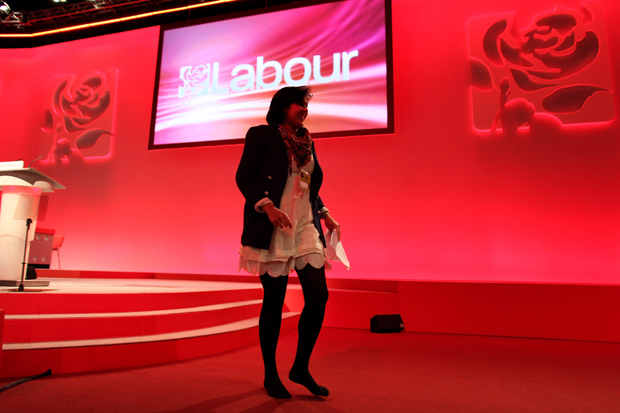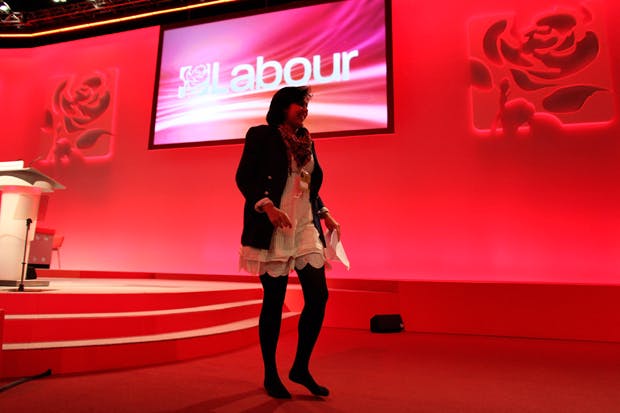One of the strangest and, in a weird way, best things to have happened to me in the past year was the emergence of a firm conviction among a quite large collection of internet weirdos that I spent my youth fighting for an elite unit of the Israeli army. It started after a boozy pre-Christmas lunch almost exactly a year ago, when a woman tweeted me. I vaguely recalled that she had tweeted me before, probably about Jews or bankers or Palestine or Dolphin Square or Jimmy Savile, all of which I get quite a lot and normally ignore. This time, though, she had a question. She wanted to know about my Twitter profile picture, and whether the olive-green shirt I’m wearing in it was my uniform from my time in the IDF.
This amused me. In that photograph, which was shot for a gadget column, I am also holding an iPhone to my head, as though it were a pistol. Nobody had ever mentioned the shirt before. ‘It’s from Topman,’ I told her, because it was.
The woman replied with a smiley face. Then she asked if I’d been in the IDF anyway, though. And I suppose, for what happened next, I have only myself to blame.
I could have just said ‘no’ but it had been a boozy lunch and I didn’t have much work on. So I started taking the piss. First, I asked her if she had been in the IDF anyway, though. This, she interpreted as wriggling, so she broadened her question to include Mossad. ‘Because that might be why I bought the shirt from Topman, you mean?’ I replied, but by now she felt Topman was a smokescreen. So I asked her if she imagined I’d done all this before I had my first job, which was on a celebrity news website writing about people like Kylie Minogue, or perhaps afterwards. And she, sensing victory, demanded details of my combat dates and unit.
At this point other people got involved. Some were enjoying themselves, such as the wag who declared I’d been dishonourably discharged from Sayeret Matkal, the special forces, after an incident in the Golan Heights. Friends weighed in to accuse me of having fought in other conflicts, such as Vietnam or Korea or the Crimean War. Other nuts came flocking, including one who wanted to know how the hell somebody who served a foreign power could sit on the Privy Council. I think he had me confused with my dad.
After a while I lost patience and told them all I was a frivolous lifestyle journalist from Edinburgh, and I’d spent a total of about four days in Israel in my entire life, and they should leave me the hell alone. Only by that point I just don’t think they believed me. And so ever since, maybe once a fortnight, a nut now accuses me of Israeli war crimes, and it all starts again. I could, I suppose, just change my photograph, but I feel that would be giving in. Plus, strange as it might sound, I don’t really mind.
‘But why?’ people ask me. ‘Why are you prepared to spend your valuable time arguing with clearly insane people on the internet who think that you, with your glasses and your adult life spent sitting down and your comedy appearances on Radio 4 and your voice like Miss Jean Brodie meeting Tony Blair, are the Jason Bourne of Tel Aviv?’ It’s a fair question, and the answer isn’t just that I’m flattered, because it makes me sound quite hard. The truth is, the Twitter nuts are illustrative. They see a Jewish name in the media and assume the Jew to whom it belongs must have twisted loyalties of some sort; a sly devotion to interests that run counter to their own. Purely and simply, that’s anti-Semitism. It is exactly what anti-Semitism is. Such accusations are hardly rare for any Jewish journalist in the age of social media and, frankly, it’s normally hard to know what to do with them. You can broadcast them more widely, but when you do, you feel yourself growing shrill, protesting too much. Plus, it’s precisely the platform the bastards want.
When it’s like this, though? There’s no downside. Everybody loves a nutter. And in the process of observing one, you can only hope, everybody can see that this is where prejudice, of all sorts, will take you. Decide that there are enemies in your midst, and only then go looking for them, and you become absurd. ‘O Lord,’ as Voltaire said, ‘make my enemies ridiculous.’
The great vaping mystery
Briefly, though, let us speak of vaping. We all vape now, right? At the Glastonbury festival this year I saw more people vaping than smoking, which felt like a Rubicon. Friends in Los Angeles tell me that Californians today vape everything, even their drugs. Someday soon, only weirdos will burn.
As I’m sure you know, everybody starts with a bitty little thing from a garage; a fake fag that looks like a real fag. Before long, they graduate on to something bigger, the size of a marker pen; a battery with a button with a tank on top. I’ve done that, too. You get more and better vapour, you can refill, it’s generally cheaper and more satisfying.
It’s what happens next which perplexes me. Six months in, everybody swaps their sensible little marker pen for a thing that looks like a Sony Walkman, with a nozzle on top. It costs five times as much, and does exactly the same thing. I don’t know why they bother. None of them can tell me. It’s really odd.
Got something to add? Join the discussion and comment below.
Get 10 issues for just $10
Subscribe to The Spectator Australia today for the next 10 magazine issues, plus full online access, for just $10.
Hugo Rifkind is a writer for the Times.
You might disagree with half of it, but you’ll enjoy reading all of it. Try your first month for free, then just $2 a week for the remainder of your first year.
















Comments
Don't miss out
Join the conversation with other Spectator Australia readers. Subscribe to leave a comment.
SUBSCRIBEAlready a subscriber? Log in